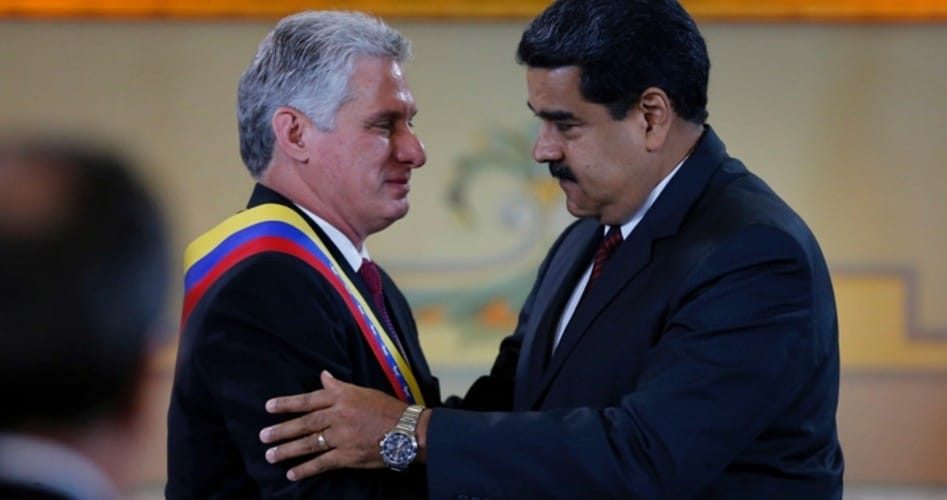
Communist regimes cannot support themselves, but must rely on outside assistance. Less than a month after communist Fidel Castro came to power in Cuba in 1959 he went to Caracas, Venezuela, hat in hand. He needed Venezuela’s oil and Venezuela’s then-dictator Romulo Betancourt welcomed Castro’s exchange deal: Cuban “assistance” to help stabilize Betancourt tyranny. That assistance came in the form of military and intelligence advisors.
Today those Cuban advisors helping Maduro remain in power number more than 20,000: teachers, coaches, sports trainers, and a large contingent of spies who have infiltrated Maduro’s military and removed dissidents.
When Maduro took over following Hugo Chávez’s death in 2013, he ramped up the deal: 100,000 barrels of crude to Cuba in exchange for continued “assistance.” Socialists and communists have to stay together in order to remain in power.
But now, thanks to Maduro’s meddling in Venezuela’s economy, that flow of oil to Cuba is now down to 40,000 barrels a day, and likely to shrink to zero if Juan Guaidó replaces Maduro, and if he keeps his word. Those 40,000 barrels represent almost a third of Cuba’s oil needs, and their loss would put additional pressure on Cuba’s struggling regime.
Just as the Trump administration planned. Back in early November when the president issued an executive order adding sanctions against Venezuela’s gold sector, there were also sanctions against two dozen entities owned or controlled by the Cuban military and intelligence services. These were added to a list of nearly 200 Cuban agencies, companies, and hotels that were already on the White House list.
Last Sunday, U.S. Secretary of State Mike Pompeo made clear who the sanctions targeted: “We’re aimed at a singular mission: ensuring that the Venezuelan people get the democracy that they so richly deserve and that the Cubans and Russians, who have been driving this country into the ground for years and years, no longer hold sway.”
The Wall Street Journal said that the policy of replacing Maduro with a friendly Guaidó who would then shut down his country’s flow of crude to Cuba was intentional:
[Trump’s foreign policy advisors] have long believed Cuba to be the more serious national-security threat. They cite Cuba’s intelligence operations in the U.S., and its efforts to spread anti-American views to other Latin American countries….
After Venezuela and Cuba, U.S. officials are eyeing Nicaragua.
Trump’s national security advisor, John Bolton, made Trump’s South American intentions clear in a speech last November: “The United States looks forward to watching each corner of the triangle fall: In Havana, in Caracas, in Managua … [this] Troika of tyranny … will crumble.”
As Ted Henken, an expert on Cuba at Baruch College in New York, explained: “Cuba has limped along for the past 15 years thanks … to its relationship with Venezuela.”
Severing that relationship by severing the flow of crude is part of the plan to reshape South American politics more to the Trump administration’s liking. The “reshaping” is going to get a big assist once the administration reinstates Cuba as a state sponsor of terrorism.
The plan looks good on paper, but there are many obstacles in its way. First, since the Obama administration opened up Cuba for business, companies in Canada and Mexico have established economic connections there. Additionally, U.S. sanctions against Cuba since the arrival of Castro have failed to dislodge that communist regime. Instead, it has had the opposite effect of driving Cuba into the willing arms of Russia and China, who seek an increasingly influential role in South America.
As libertarian Jacob Hornberger, president of the Future of Freedom Foundation, warned:
The Founding Fathers warned us against empire, militarism, standing armies, and war. They pointed out that among all the enemies of liberty and prosperity, these were the greatest. That’s why they stood for a limited-government republic, one in which the federal government lacked the power and the means to go abroad “in search of monsters to destroy.”
Venezuela, Cuba, and Nicaragua are the “monsters” currently in the White House’s crosshairs.
Correction: As originally published, this article mistakenly referred to Cuban president Fulgencio Batista as the Venezuelan dictator Castro visited after coming to power. The dictator in Venezuela was Romulo Betancourt.
Photo of Cuban President Miguel Díaz-Canel and Venezuelan President Nicolás Maduro: AP Images
An Ivy League graduate and former investment advisor, Bob is a regular contributor to The New American magazine and writes primarily on economics and politics. He can be reached at [email protected].
Related article:
Pence Assures Venezuelan Opposition Leader Guaidó of U.S. Support



